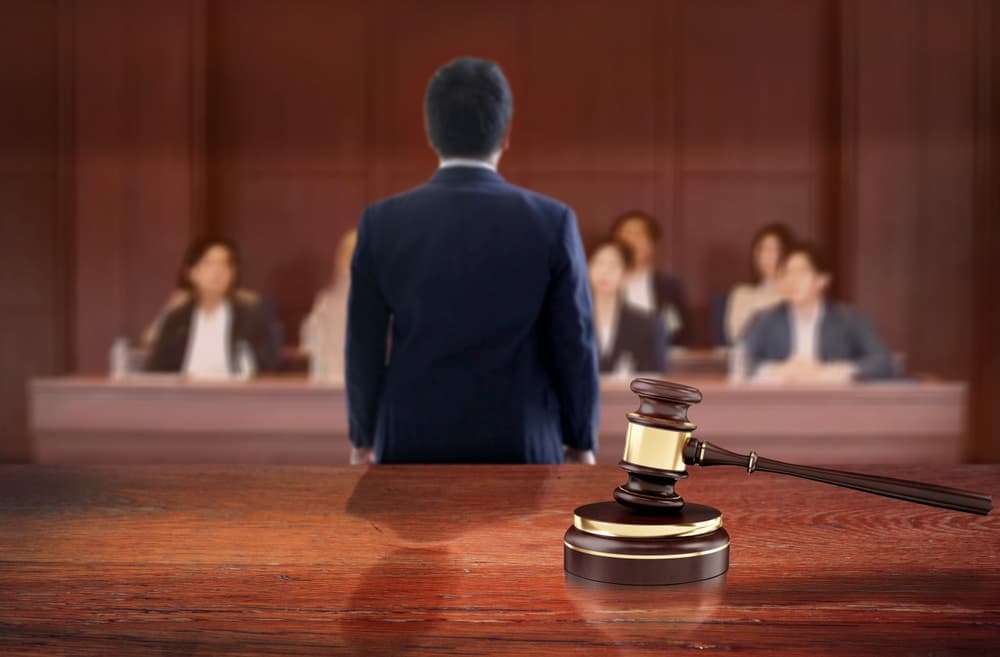Steven A. Bagen | December 3, 2024 | Personal Injury

Most personal injury claims do not go to trial because insurance companies want to settle out of court at every opportunity. It benefits their time and pocketbooks to do so. The best way to ensure an insurer pays you a fair settlement is to hire a personal injury attorney to handle your claim. Schedule a free consultation to discuss the merits of your case. You’ll want to discover a strategy to maximize your compensation.
If you’ve been injured in a car accident caused by a negligent driver, seek medical attention first, then contact an experienced car accident lawyer near you for legal support.
Why Insurance Companies Want to Settle Out of Court

Insurance companies want to minimize their financial risks and payouts—making settling claims outside of court preferable. The primary reasons insurers want to settle out of court are as follows:
- Time Constraints: Insurance companies want to resolve injury claims quickly. While it may take months to years to settle a personal injury claim without trial, going to court takes longer. It’s a time-consuming process that can add years to the timeline of your settlement. Time equals money they’re not looking to spend.
- Litigation Costs: The number one reason insurance companies want to settle outside of court is to avoid litigation costs. Trial expenses can add up quickly when you consider legal fees, court proceeding costs, and the expense of expert witnesses who testify on your behalf.
- Unpredictable Outcomes: If your claim goes to court, the fate of securing compensation falls into the hands of juries. Insurance companies don’t want to risk dealing with unpredictable decisions that may result in them paying a significantly higher settlement than anticipated. Negotiating with a lawyer is easier and more cost-effective than taking their chances in court.
- Protect Their Reputation: Public image is everything. Insurance companies don’t want their name or brand tarnished by bad public relations (PR). High-profile lawsuits may significantly damage a company’s reputation, and it’s a risk they’re mostly unwilling to take.
While insurance companies prefer to settle out of court, that doesn’t mean they avoid lawsuits altogether. If they are unwilling to pay a valid claim or practice bad-faith tactics, personal injury lawyers will file a civil lawsuit to recover compensation for their clients. Insurers know this, further incentivizing their desire to settle out of court.
Understanding Insurance Company Tactics
An insurance claims adjuster may employ various tactics to minimize their company’s losses on accident claims. Understanding and recognizing these tactics can help injured parties avoid becoming victims of these practices.
Pressuring for Quick Settlements

Insurance companies commonly propose quick settlement offers in an attempt to minimize payouts. They know and understand that claimants often accept an undervalued offer to settle quickly because of the surmounting stress associated with medical expenses and income losses.
Unfortunately, this tactic causes personal injury victims to accept settlement offers before they’ve established the full scope of their injuries and damages. Always speak with a personal injury lawyer to assess the full magnitude of your claim before accepting a settlement.
Misrepresenting Insurance Policy Terms
Another common tactic liable insurers utilize is intentionally misinterpreting or misrepresenting insurance policy terms when dealing with claimants. They do this to allege certain damages are not covered in the policy when they are. A personal injury attorney will carefully review policy terms and shut down this desperate tactic.
Disputing Medical Treatment Costs
Insurers frequently dispute the cost or need for specific medical and rehabilitative treatments outlined in your claim. It’s typical for an insurance company to argue that medical procedures were unnecessary or are billed with inflated costs. This tactic helps minimize their payouts. Detailed medical records coupled with a physician’s expert testimony will help refute those claims.
Requesting Excessive Documentation
A typical example of bad-faith insurance tactics occurs when a claims adjuster requests excessive and unnecessary documentation from injury victims. The purpose is twofold. First, insurers will ask for excessive and unnecessary documentation to overwhelm claimants by slowing the claims process.
Then, when they propose their first low-ball offer, claimants will accept it without negotiation or rejection—often fearing that the insurance company may revoke the offer or counter with a lower one if they do not.
Second, it allows them to search for things they can use to deny liability or severely undervalue claims. For example, they will ask you for a medical records release. You should never provide them access to your complete medical history. They will look for any way to link your symptoms to pre-existing injuries and conditions to deny partial liability and significantly underpay claims. Or to deny them altogether.
Contact a personal injury lawyer immediately if you’ve already released your medical records to the liable insurance company. They can help strategize a compensation plan—navigating those obstacles by preparing for them beforehand.
Hiring Private Investigators
Another standard tactic is to employ private investigators to secure evidence against claimants so they can deny claims. This practice may involve having a P.I. following you around, trying to gather video surveillance of you engaging in incriminating activities for someone with your claimed injuries.
Surveilling Social Media

Stalking injured party’s social media accounts is another viable way liable insurers obtain evidence that affords them to deny claims. Common social media posts insurance companies use to deny claims include:
- Pictures or Videos of Physical Activities—Evidence of you slow dancing at a wedding or uploading the latest TikTok dance trend with your teen can be enough to get your claim denied or undervalued.
- Being Tagged in Posts—When friends and family tag you in posts having a good time, insurers can use them to downplay the severity of your injuries and pay less on your claim. A picture of you and a friend on an outing can be twisted to suggest exaggerated injuries.
- Posts About Traveling—It doesn’t matter if you had a non-refundable ticket and opted to go while injured to avoid the loss. Posting about travels, pictures, videos, and tagging will not bode well for your case.
- Former Posts—Investigators can do deep dives into old posts, searching for anything indicative of pre-existing injury.
It’s important to make all social media accounts private and refrain from posting to them. It may sound harsh. However, losing your chance to recover financial compensation for legitimate injuries and monetary losses is considerably harsher.
Consult a personal injury attorney if you’ve posted on social media, especially about your accident and injuries. They can advise you on security measures and proper social media etiquette moving forward.
Undervaluing Non-Economic Damages
Non-economic damages are the pain and suffering incurred from the accident. Because these damages are more challenging to prove, insurance companies attempt to undervalue them.
Legally unrepresented accident victims don’t generally know how to value these damages because they don’t come with a receipt. Standard non-economic damages are as follows:
- Acute pain
- Chronic pain conditions
- Lost sleep
- Emotional distress
- Psychological trauma (anxiety, depression, PTSD)
- Loss of consortium (companionship, physical intimacy)
- Anger and frustration after an accident
- Humiliation and embarrassment following an accident
- Limitations or restrictions on daily activities
- Disabilities
- Traumatic brain injuries (TBIs)
- Permanent impairments (amputations, scarring, disfigurement)
An experienced personal injury attorney is highly qualified and skilled in thoroughly exhausting a comprehensive list of non-economic damages to maximize compensation. They will include them in your demand letter to liable insurers and fight for your right to secure a settlement that pays for them.
Delaying Claims
Delaying the claims process is another tactic insurance companies use to exhaust claimants desperate for financial relief. Injured parties may feel pressured to accept lower settlement offers to pay medical bills and compensate for sustained income losses. This is especially true for accident victims who do not have health insurance or personal injury protection (PIP) coverage through their auto insurer.
How Does a Personal Injury Lawyer Get a Fair Settlement From Insurers?

In addition to protecting you against bad-faith insurance tactics, a personal injury attorney will demand a fair settlement for your accident, injuries, and damages. They thoroughly investigate your claim, prove negligence, calculate all your losses, negotiate maximum settlements, and, if need be, represent your case in court.
Thoroughly Investigating Your Claim
Your attorney will provide many services to ensure a comprehensive investigation into your claim. The personal injury accident investigation process includes the following:
- Gathering and preserving evidence for analysis (police reports, photos and video of the accident scene, medical records and bills)
- Investigating the scene of the accident for important evidence
- Identifying and interviewing key witnesses
- Consulting with expert witnesses to prove liability and damages
- Working with accident reconstruction specialists to prove negligence
- Reviewing all documents (insurance policies, police and accident reports, property damage reports, employment records)
A personal injury lawyer’s investigation process can be time-consuming as they explore all avenues of liability. You should bring any evidence you have to your initial consultation. This will help them better assess the circumstances of your case and provide you with more informed information about your case’s specifics.
Proving Negligence
Injured parties or their attorneys are responsible for proving the four elements of negligence associated with personal injury law: owed duty of care, breach of duty, causation, and damages. This process involves demonstrating the following:
- The defendant owed you a duty of care (obey traffic laws, keep their property safe).
- The defendant breached their duty (speeding, drunk driving, keeping hazardous conditions on their property).
- Their breach of duty is directly responsible for your injuries.
- Your injuries caused actual damages (medical bills, vehicle repair invoices or replacement, income losses, property repairs).
Personal injury attorneys will only take your case if they are confident they can win. That means they are sure or almost certain they can prove negligence in your claim. Personal injury attorneys rely heavily on accident reconstruction and expert testimony to cement liability.
Calculating Losses and Determining Damages
To properly value the damages in your claim, your lawyer will consider all tangible and intangible losses. These are commonly known as economic and non-economic damages. These damages frequently involve:
- Healthcare Costs: All medical, rehabilitation, and disability costs, including future healthcare expenses.
- Lost Income: Lost earnings, including salary, bonuses, commissions, benefits, and diminished earning capacity.
- Property Damages: Reimbursement for all vehicle-related and personal property destroyed in the accident.
- Pain and Suffering: Psychological trauma, acute and chronic pain, mental anguish, sleep disturbances, and a decreased quality of life.
Keep copies of all billing statements, invoices, receipts, and other financial documents demonstrating these expenses to prove your economic losses. Proving your non-economic damages (pain and suffering) involves documenting them in an injury journal.
Negotiating for Maximum Compensation
Once your personal injury lawyer has valued your claim’s damages, they will draft and send a demand letter to the insurance company. The demand letter is rarely met with a payment for the amount demanded. Instead, it generally acts as a beginning for negotiations.
The insurance company will respond with a low offer, and your attorney will counter for more. Negotiations can take time and involve several back-and-forth exchanges. Once your attorney and liable insurers agree, they will issue a settlement check.
Representing You in Court
While insurance companies want to settle out of court, sometimes, cases go to trial. If your personal injury attorney and liable insurers cannot come to an agreement, your lawyer will file a lawsuit to recover financial compensation. In that case, your attorney will:
- Enter into discovery and exchange information, interrogatories, and depositions with defense attorneys
- Prepare evidence for presentation
- Prepare witnesses for trial
- Secure expert witness testimony
- Pre-trial motions
- Another attempt at settlement negotiations
- Trial and verdict
If your accident case moves to court, a judge and jury will be responsible for awarding or denying your damages. Recent statistics demonstrate that about 95 percent of pending lawsuits end in a pre-trial settlement, meaning that only one in twenty personal injury cases is resolved in court.
Schedule a Free Case Evaluation With a Personal Injury Lawyer Now
Schedule a free case evaluation with a reputable and experienced Daytona personal injury attorney. They work within contingent fee arrangements, meaning there are no upfront costs; they only get paid if you do. Don’t delay. Personal injury claims have statutes of limitations that are conducive to your location and accident and injury type. An attorney will ensure you meet filing and other legal deadlines.
